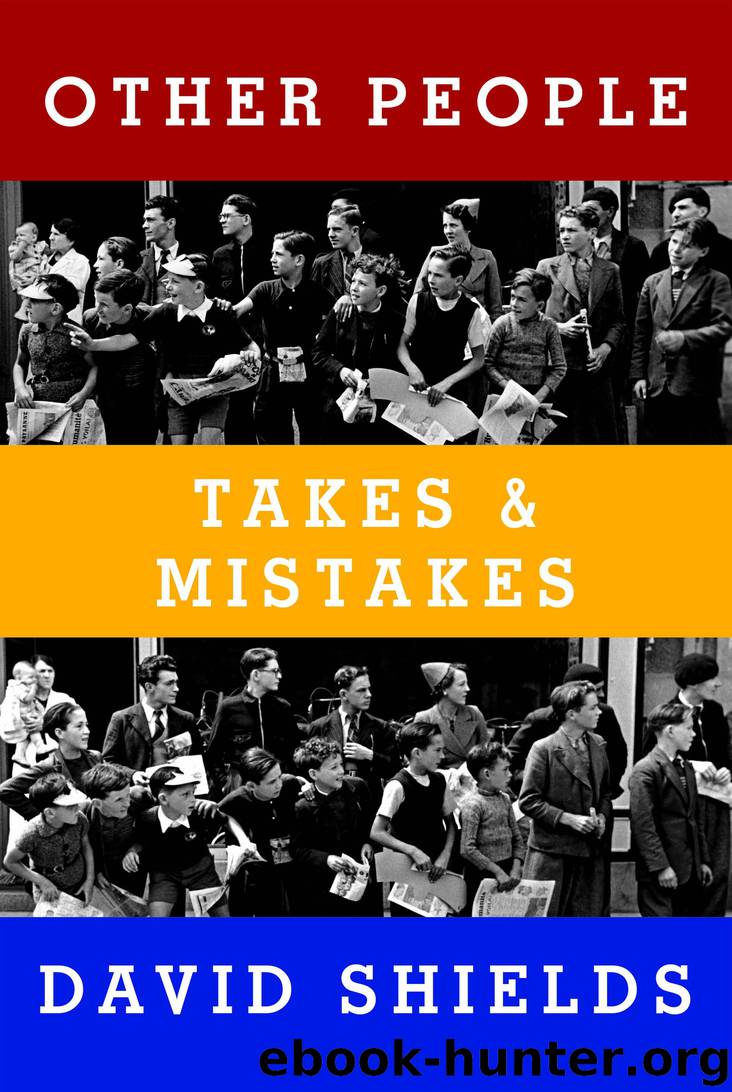Other People by David Shields

Author:David Shields
Language: eng
Format: epub
Publisher: Knopf Doubleday Publishing Group
Published: 2017-02-21T05:00:00+00:00
HISTORY OF AMERICA, #34
The question before the court is why Charles Barkley—NBA superstar turned NBA/USA commentator—has, in the words of his TNT colleague Ernie Johnson, “diplomatic immunity.” Why does Barkley get to say virtually whatever he wants (criticize anyone, anything), whereas, for instance, the producers of Barbershop were forced to apologize for having a fictional character call Martin Luther King a “ho”? Barkley says it’s because he’s consistent: “You know I’m going to praise you if you do good, and I’m gonna criticize you if you do bad”—which actually has very little to do with it. Johnson says, “I think it’s because his softer side is well known”—which has more to do with it. NBC Sports Group chairman Mark Lazarus says, “He can straddle that line without going over it”—which has even more to do with it.
Dave Coskey, the Philadelphia 76ers’ director of public relations when Barkley played there, said, “Most of these guys are jerks who want you to think they’re nice guys. Charles is a genuinely nice guy who wants you to think he’s a jerk.” In Look Who’s Talking Now (1993), a little girl, age three, watches over and over a tape of Barkley playing basketball. She carries around a Barkley doll and is infatuated with him. In her daydream, she plays basketball with him and he is her best friend and perfect role model; he even lets her beat him. The fantasy worked because it contradicted Barkley’s bad-boy persona at the time but conformed to what we intuited about him more deeply. Why was it so funny when, on Saturday Night Live, Barkley played a game of one-on-one against Barney the purple dinosaur and wound up punching Barney’s lights out? Because we all know Barkley is Barney. His tail bent and one eyeball dangling from its socket, Barney said, “Charles told me I’m special.”
Sports Illustrated once called Charles Barkley “Alan Keyes with monster ups.” The ups are over. Despite endorsing Weight Watchers, Barkley still carries two hundred and sixty pounds on his six-foot-four-inch frame; his immensity is crucial to us loving him so much. Imagine a whippet-thin Oprah. It doesn’t work. In America, we need our wizards to come in warm/cuddly packages. As he likes to remind himself and us, Barkley is worth fifty million dollars (plus or minus ten million dollars; he is endlessly paying off massive gambling debts). No one ever got rich truly discomfiting the populace. Lady Gaga’s meat dress—that much activism we can handle. In the same way, Barkley is the reassuring rebel, the candid huggy bear, a weird admixture of Muhammad Ali and George Foreman. Barkley’s race anger is exactly the amount of race anger we can process, which is to say: not that much. He’s a race man of nearly nineteenth-century vintage: He believes in everybody pulling himself up by his bootstraps. Apotheosizing Charles Barkley is the only reparation we’re going to be handing out this year (or next); white America needs to know that beneath all that black rage is, finally, forgiveness, even love.
Download
This site does not store any files on its server. We only index and link to content provided by other sites. Please contact the content providers to delete copyright contents if any and email us, we'll remove relevant links or contents immediately.
Crazy Rich Asians by Kevin Kwan(9268)
How to Bang a Billionaire by Alexis Hall(8133)
Giovanni's Room by James Baldwin(7313)
Win Bigly by Scott Adams(7181)
Little Fires Everywhere by Celeste Ng(7176)
Pachinko by Min Jin Lee(5676)
Tease (Temptation Series Book 4) by Ella Frank(5623)
The Fire Next Time by James Baldwin(5421)
The Perks of Being a Wallflower by Stephen Chbosky(4632)
China Rich Girlfriend by Kwan Kevin(4551)
Bluets by Maggie Nelson(4541)
First Position by Melissa Brayden(4515)
The Sympathizer by Viet Thanh Nguyen(4381)
Rich People Problems by Kevin Kwan(4279)
A Little Life (2015) by Hanya Yanagihara(4273)
Right Here, Right Now by Georgia Beers(4194)
Walking by Henry David Thoreau(3948)
Catherine Anderson - Comanche 03 by Indigo Blue(3618)
The Death of the Heart by Elizabeth Bowen(3599)
